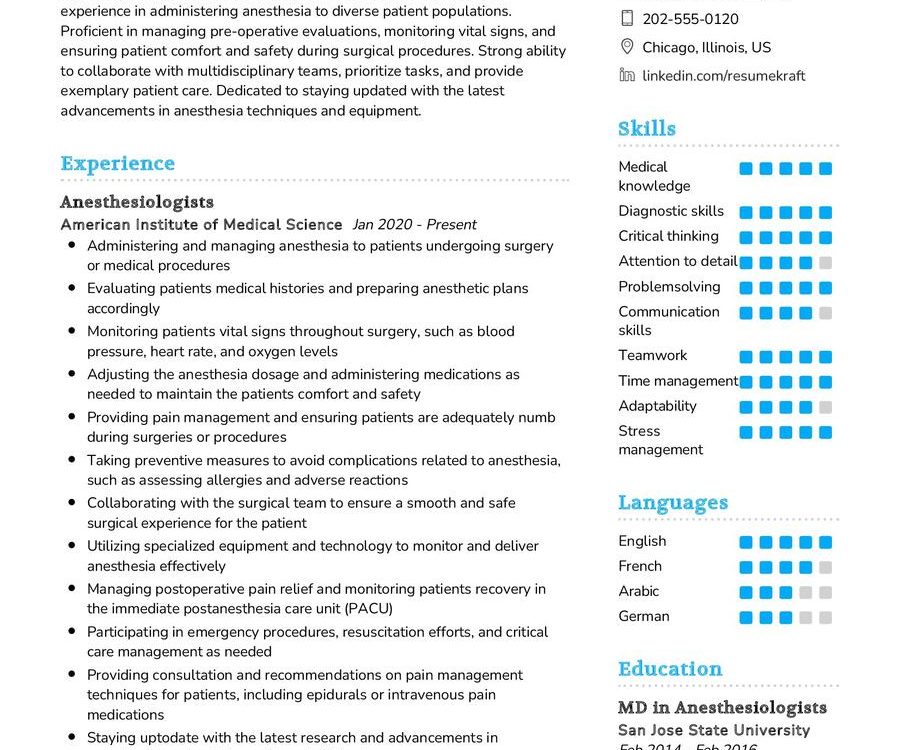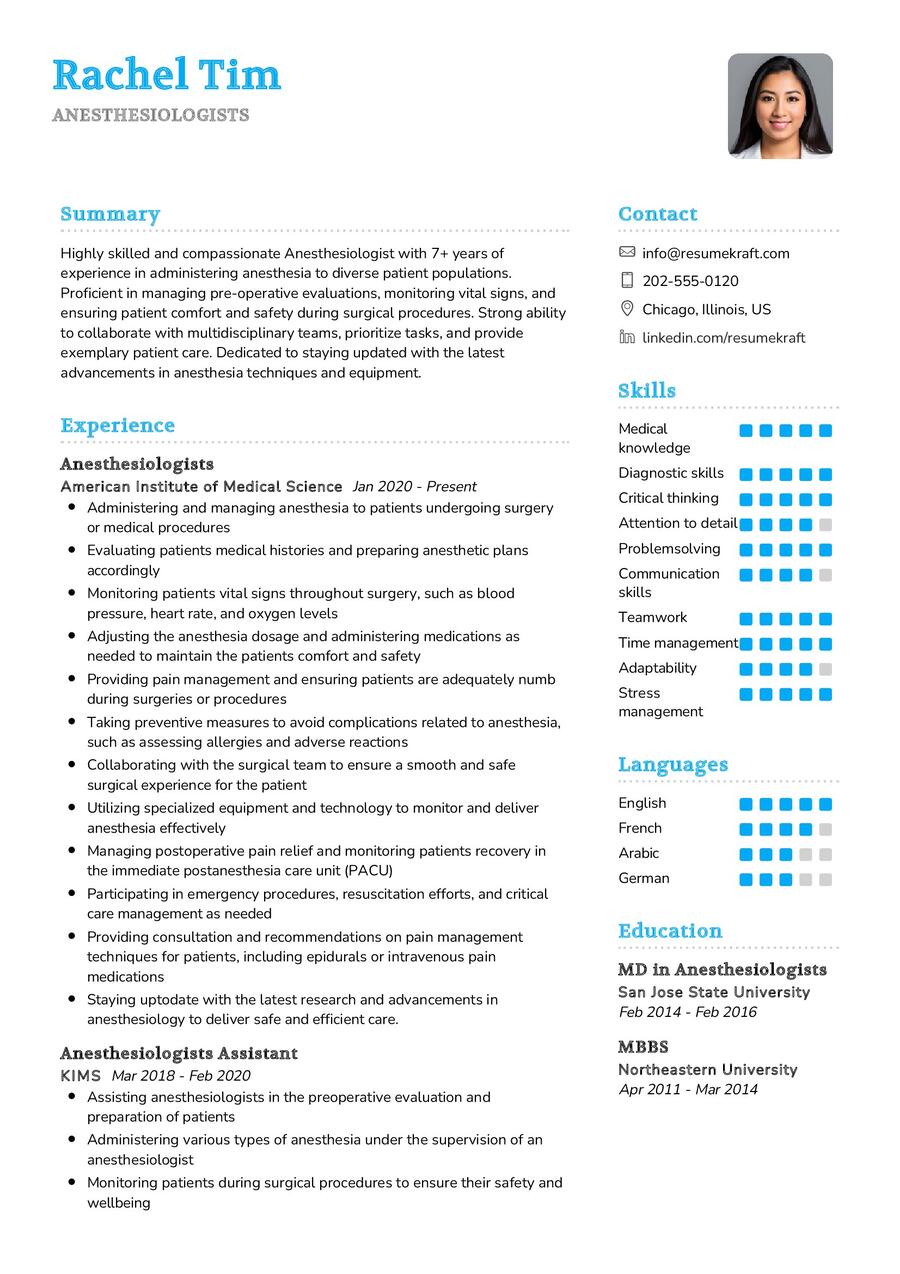Exploring the Role of Anesthesiologists
As the field of healthcare continues to advance, the role of an Anesthesiologist remains integral in ensuring patient comfort and safety during medical procedures. This article will delve into the multifaceted responsibilities of Anesthesiologists, the educational and experiential requirements for this role, and tips for crafting a compelling resume that showcases their expertise.
What are the Key Responsibilities of Anesthesiologists?
Anesthesiologists play a crucial role in the surgical process, administering anesthesia to patients and monitoring their vital signs throughout medical procedures. Their responsibilities extend beyond simply administering anesthesia; let’s explore the diverse roles that Anesthesiologists undertake:
- Conducting pre-anesthetic assessments to evaluate patient health and determine the most suitable anesthesia plan.
- Administering various types of anesthesia, including general, regional, and local, depending on the nature of the medical procedure.
- Monitoring patient vital signs, such as heart rate, blood pressure, and oxygen levels, to ensure a safe and stable condition during surgery.
- Adjusting anesthesia levels as needed and addressing any complications that may arise during the procedure.
- Collaborating with surgical teams to develop and implement pain management strategies for post-operative care.
- Staying abreast of advancements in anesthesia techniques and technologies to provide the highest quality patient care.
Each responsibility reflects the critical nature of the Anesthesiologist’s role in the surgical journey, highlighting their commitment to patient well-being.
Education and Training Requirements for Anesthesiologists
Becoming an Anesthesiologist involves rigorous education and specialized training. Here are the key requirements for aspiring professionals in this field:
- Completion of a Bachelor’s degree in a relevant field, such as Biology or Pre-Medical Studies.
- Successful completion of medical school, leading to a Doctor of Medicine (MD) or Doctor of Osteopathic Medicine (DO) degree.
- Residency training in Anesthesiology, typically lasting four years, where individuals gain hands-on experience in various anesthesia procedures.
- Obtaining state licensure, which involves passing the United States Medical Licensing Examination (USMLE) or the Comprehensive Osteopathic Medical Licensing Examination (COMLEX).
- Optional board certification through the American Board of Anesthesiology (ABA) or the American Osteopathic Board of Anesthesiology (AOBA).
- Continual participation in professional development and continuing education to stay current with advancements in the field.
The educational journey of an Anesthesiologist is demanding, requiring a strong foundation in the sciences and a commitment to ongoing learning.
Skills Required for Anesthesiologists
Successful Anesthesiologists possess a blend of technical and interpersonal skills to navigate the complexities of their role. Let’s explore the essential skills for this profession:
Technical Skills:
- Expertise in administering various types of anesthesia, tailoring the approach to each patient’s needs.
- Advanced knowledge of pharmacology and the effects of anesthesia on the human body.
- Proficiency in using monitoring equipment to track patient vital signs accurately.
- Quick decision-making abilities to address unforeseen complications during surgery.
- Ability to collaborate with surgical teams and other healthcare professionals effectively.
Interpersonal Skills:
- Effective communication to explain anesthesia plans and post-operative care to patients and their families.
- Empathy and bedside manner to alleviate patient anxiety and build trust.
- Teamwork and collaboration with other healthcare professionals in a high-pressure surgical environment.
- Attention to detail to ensure the precise administration of anesthesia and monitoring of vital signs.
- Stress management to handle the demands of surgical procedures and potential emergencies.
These skills collectively contribute to the success of an Anesthesiologist in delivering safe and effective anesthesia care.
Building a Compelling Anesthesiologist Resume
Crafting a standout resume is crucial for Anesthesiologists seeking new opportunities. Here are some tips to create a compelling resume that showcases your expertise:
- Highlight specific instances where you successfully administered anesthesia in diverse surgical procedures.
- Showcase your ability to adapt to different patient needs by detailing experiences with various anesthesia types.
- Quantify your achievements, such as the number of successful procedures conducted or any improvements in patient outcomes.
- List any additional certifications or specialized training you’ve undertaken to enhance your skills.
- Personalize your resume for each application, emphasizing skills and experiences relevant to the specific job.
Your resume is a reflection of your journey as an Anesthesiologist, and a well-crafted document can make a significant impact on potential employers.
Anesthesiologist Resume Summary Examples
Your resume summary serves as the introduction to your professional story. Here are some examples to inspire your own summary:
- “Dedicated Anesthesiologist with over a decade of experience, skilled in providing precise and tailored anesthesia care across a range of surgical specialties.”
- “Experienced Anesthesiologist committed to patient safety, with a proven track record of successful anesthesia administration in high-pressure surgical environments.”
- “Detail-oriented Anesthesiologist with a focus on optimizing patient outcomes through advanced anesthesia techniques and continuous professional development.”
Each summary provides a snapshot of your expertise and sets the tone for your resume.
Experience Section for Your Anesthesiologist Resume
Your experience section is the core of your resume, detailing your professional journey. Here are examples to guide you:
- “Led anesthesia teams in a busy urban hospital, managing a diverse caseload and ensuring optimal patient outcomes.”
- “Contributed to the implementation of enhanced anesthesia protocols, resulting in a 15% reduction in post-operative complications.”
- “Collaborated with surgical teams to develop and implement pain management strategies, improving patient comfort during recovery.”
Each experience entry narrates your impact, contributions, and growth as an Anesthesiologist.
Education Section for Your Anesthesiologist Resume
Your educational background is a key aspect of your resume. Here’s how to present it effectively:
- Doctor of Medicine (MD), [Your Medical School], [Year of Graduation]
- Residency in Anesthesiology, [Hospital Name], [Years of Residency]
- Board Certification, American Board of Anesthesiology (ABA), [Year of Certification]
Each educational entry signifies a milestone in your journey toward becoming an Anesthesiologist.
Common Mistakes to Avoid in Your Anesthesiologist Resume
Avoiding common resume pitfalls is crucial for making a positive impression. Here are mistakes to steer clear of:
- Avoid using generic terms; tailor your resume for each application to highlight your unique qualifications.
- Focus on accomplishments, not just duties, to provide depth to your professional narrative.
- Include a cover letter to complement your resume, providing a more personalized introduction to your candidacy.
- Balance technical terms with layman’s language to ensure readability for a broader audience.
- Thoroughly proofread your resume to maintain a professional image and attention to detail.
Steering clear of these mistakes enhances the effectiveness of your Anesthesiologist resume.
Key Takeaways for Your Anesthesiologist Resume
As we conclude this comprehensive guide, remember these key points when crafting your Anesthesiologist resume:
- Emphasize your diverse experiences in administering anesthesia across different surgical procedures.
- Showcase your adaptability and ability to tailor anesthesia care to individual patient needs.
- Quantify your achievements to provide tangible evidence of your impact as an Anesthesiologist.
- Include relevant certifications and specialized training to demonstrate your commitment to professional development.
Finally, feel free to utilize resources like AI Resume Builder, Resume Design, Resume Samples, Resume Examples, Resume Skills, Resume Help, Resume Synonyms, and Job Responsibilities to create a standout application and prepare for the Anesthesiologist job interview</


